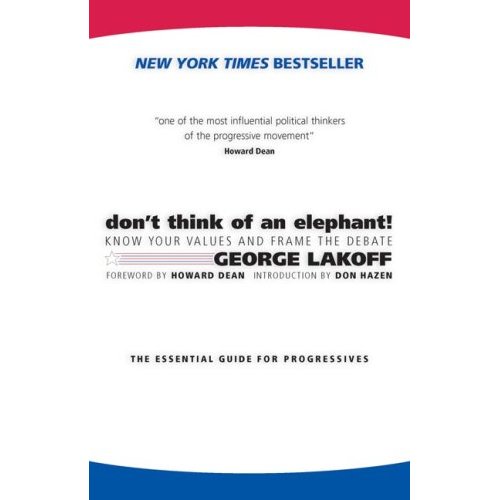Let’s say that thinking of elephants is something that I want everyone to stop doing because for some reason elephants are bad for you. So I go ahead and say “everyone: don’t think of an elephant!”; and so everyone cannot help but think of an elephant because I used the word “elephant.” Ironic, isn’t?Â
I must confess that ever since I discovered the book “Don’t Think of an Elephant”, I have been fascinated by the dynamics of how linguistic frames work and of the subversive power of negation. The author of that book, linguists professor, George Lakoff, explains very clearly how the dynamic works. He provides several examples, the most powerful of all being the one about how when President Nixon said “I am not a crook”,  Nixon himself sealed his fate because all that everyone remembers him by is how he was a “crook”. In essence, he shot himself in the foot by using a negative that just reinforced what everybody was already thinking about him: that he was a crook.Â
Last week in class we touched a little on the way negation in PR campaings work. One example was how sometimes anti-smoking ads that are produced with the tobacco industry’s money are so ridiculoulsy over-the-top that one can’t help but feel a desire (specially if one is underage or just relatively young) to just rebel against the ad and pick up a ciragette to “stick it to the man.” It’s a pretty clever ploy that the tobacco industry’s got going on.Â
I’m also reminded of just how sometimes ineffective anti-drug ads are because they are so over-the-top and so ridiculous that they achieve the opposite effect of what they set out to do. For example, the video below shows a dog talking. Now, after watching this video, am I supposed to understand the message that there are better things to do than smoke pot or am I getting the message that I should start smoking pot because it’ll make my dog talk … and well, how cool would that be?!Â
[youtube=http://www.youtube.com/watch?v=jgJdVEoVbgg]
I cannot help but remember back to a Psychology textbook (sixth edition) that I read a few years back by Carole Wade & Carol Travis. In a section titled “When Punishment Fails” about how Operant Conditioning (for the definition of what it is go to: http://en.wikipedia.org/wiki/Operant_conditioning) works in real life, the book lists these two (out of six) principles (page 249):
“*Punishment conveys little information: If it immediately follows the misbehavior, punishment may tell the recipient what not to do. But it does not communicate what the person (or animal) should do…[extrapolating this concept onto the field of advertisement, one immediately can see that in order for a message to be effective, it has to tell the recipient what action he or she should take instead of just what not to do].Â
*An action intended to punish may instead be reinforcing because it brings attention. Indeed, in some cases, angry attention may be just what the offender is after… [extrapolating this concept onto messaging, it highlights the importance of avoiding the use of negation and instead offer an affirmative message; Nixon could have said I’m a man of integrity, instead of his infamous I’m not a crook. In messaging, by bringing attention to the very same thing we are trying to stop or get away from, we actually reinforce it by putting a verbal magnifying glass on it]”
